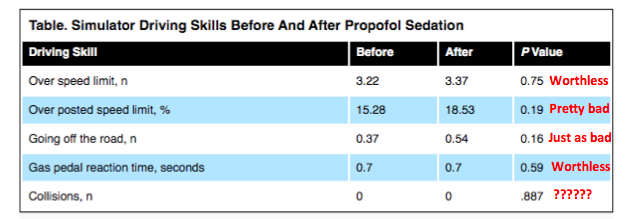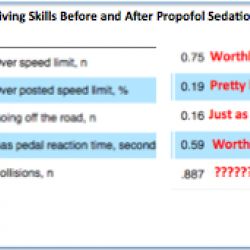Should people who were given propofol be allowed to drive home? Are men drivers better or worse than women? Some ghastly chemistry poetry, and one of the funniest YouTube videos ever. Oh, to answer the original question: it's impossible to tell from this study. Here's why.
I'm a huge fan of 2,6-diisopropylphenol (aka Diprivan, propofol, "Milk of Amnesia"). So much so that I wrote a 2016 ode extolling its virtues (See Your Next Colonoscopy May Be More Fun Than Golf.) It even edged out Versed: The Second Coolest Drug Out There.
Ready for some ghastly chemist poetry?
Organic chemists are hardly known for our dazzling balladry, but since I routinely attempt plenty of other s### I'm not even remotely qualified to dabble in, here goes...
An Ode to Propofol
"I lay on the table, nice and calm
A needle was placed in my arm
The nurse said 'don't worry'
I felt a bit a blurry
And awoke with a lust for chicken parm."
Judges?

Image: Clipart
Which is another way of saying that you don't just awake without nausea, but often with a monster appetite. That's the beauty of the drug. And the half-life of the stuff is so short that most people walk out of the hospital in less than an hour.
Here's a catch. Most facilities will not allow you to drive during that day, so you need someone to pick you up. In New York, that's rather silly. We have cabs and the risk of driving after propofol pales by comparison to that of getting mauled in a taxi accident. But, much of the country doesn't have readily available cab service, so if you don't have a friend to pick you up you can be held hostage in the waiting room. This is why a group at the Cleveland Clinic asks the question "Can You Let Patients Drive Home After Propofol?" (1)
What do the docs say?
I'm rather shocked that this paper was even written because if someone merely toots one out on the trip home (2) in their car, is it really that far-fetched that a bunch of vipers personal injury lawyers will be on high alert for any auto accident that may (or may not be) have been caused by the drug? Or the toot?
Nonetheless, let's see what the paper says. Researchers at the Cleveland Clinic maintain that forbidding people who have undergone procedures that use propofol may be unnecessarily strict.
“Our study did not show significant differences in the driving skills of patients at baseline and after achieving an Aldrete score of 9 following recovery from the procedure,”
Pooja Lal, MD, a resident in internal medicine at Cleveland Clinic Foundation, in Ohio. (The 10-point Aldrete score is a tool to assess the immediate recovery after anesthesia.)
And John J. Vargo, MD, MPH, the senior author, who is the director of Enterprise Endoscopy Operations at Cleveland Clinic, and the president of the American Society for Gastrointestinal Endoscopy, had this to say:
"The study indicates that carefully selected patients are able to drive themselves home following certain procedures, “barring any complications, [ but the] results must be validated."
Before I say another word - a little humor. The following YouTube video (Women Drivers Compilation) may be deemed offensive to some woman drivers (3), but it's also (possibly) the funniest 3:43 minutes you'll ever see online. MAKE SURE THE VOLUME IS ON! The music is just as funny as the video.
https://www.youtube.com/watch?v=4wT7zM8XgXQ

Image: YouTube
The Bottom Line
Unfortunately, in this study, there isn't a bottom line, a top line, or any other type of line. so I won't bother going through all the details. They mean nothing. Here's why: Check out the statistics table. Comments are added in red.

Table 1. Original Source: Gastroenterology & Endoscopy News
What a mess. The authors cite five parameters related to driving following propofol administration, but none of which comes even close to the minimum value (P = 0.05), which is defined as the "gold standard" for attaining statistical significance. Any number higher than that increases the odds the differences in measurements occur solely doe to chance. You will note that none of the five parameters that were evaluated come even close to even the most liberal p-value.
Now, let's rephrase this entire paper and answer the questions posted by the authors (Table 1).
- Do propofol and non-propofol patients drive at different speeds? Impossible to tell
- Do the groups exceed speed limits? Impossible to tell
- Does the propofol group drive off the road more frequently? Impossible to tell
- Is there a difference between the gas pedal reaction time in both groups? Impossible to tell
- Did one group have more accidents than the other? Impossible to tell
- Does this study demonstrate that patients who have been given propofol for a routine procedure are any better, worse, or the same at driving that patients who didn't get the drug? Impossible to tell.
While it is an intriguing idea, especially during COVID time where people are avoiding even friends and family, to have patients drive to and from the facility, this study doesn't answer a single question. None.
Let's send this one to the carwash.
Speaking of which, during these very dark times, a few yuks can't hurt. This will give you more than a few. Carwash - one of the funniest movies ever made. And the score is amazing. Here's the trailer. Enjoy.
https://www.youtube.com/watch?v=Jf7yn9GfJZ4
NOTES:
(1) Originally published in Gastroenterology & Endoscopy News. There may be a paywall. If so, go here: https://www.gastroendonews.com/In-the-News/Article/09-20/Can-You-Let-Patients-Drive-Home-After-Propofol-/59441
(2) "Toots one out" is an Olympian understatement for the recovery period for those who have had colonoscopies. Why? In order to get a better view the gastroenterologist blasts in enough air to fill the Goodyear blimp. Guess what? That air has to come out. This provides an endless source of amusement for those in the recovery room because some world-class flatuses (nope, not flati) make it sound like an orchestra warming up. "You go granny!" is not an uncommon utterance. Seeing the granny-covering blanket flying across the room is less common but more amusing.
(3) Yes, I know that women drivers are safer than men drives. This factoid is widely-known.

